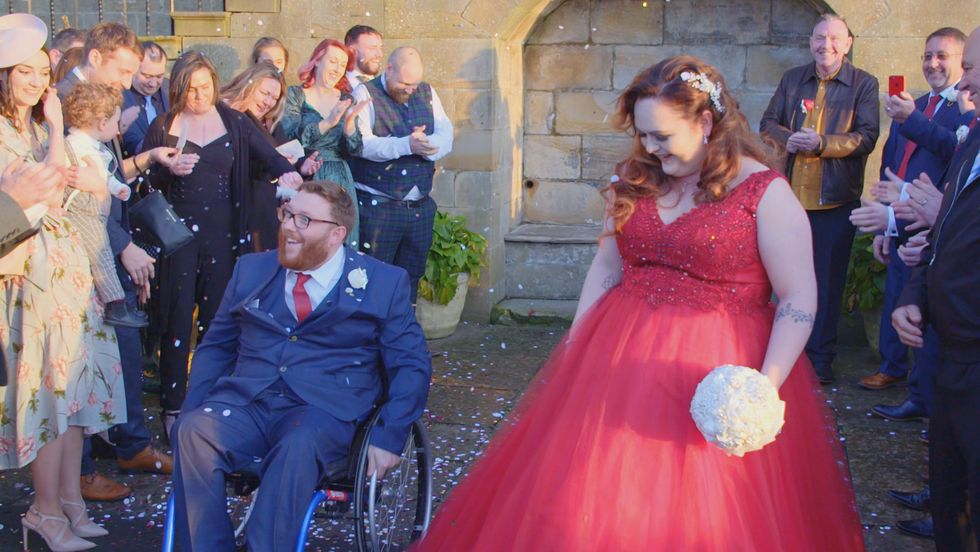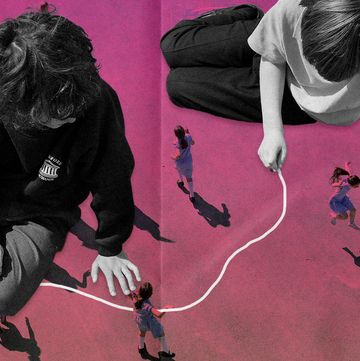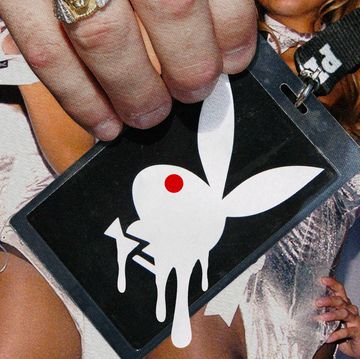Waking up with a start, Rochelle’s sleep addled brain came around quickly to the disturbance. Underneath the covers, her legs were violently shaking. Not just a stubborn tremor, but furious, frequent convulsions, as if the tectonic plates of her own body were shifting. Panic set in as she realised she couldn’t control her limbs well enough even to take the ten or so steps to her sleeping children’s bedrooms.
Rochelle didn’t know it at the time, but what she was experiencing was the onset of Tourette Syndrome as a result of stress. The rare condition, which causes a person to make involuntary sounds and movements known as tics, is usually detected in children. But Rochelle was 28-years-old when she experienced the first onslaught of intense physical impulses that would stay with her forever.
The night before had been totally normal. She was recently single and had put her two children to bed before doing a few jobs around the house and going to sleep herself. “But then I woke at about 2 o’clock in the morning, and my legs were vigorously shaking. I had no idea why. I couldn’t get them to stop,” Rochelle tells Cosmopolitan.
Having sustained back damage during pregnancy that was so severe it temporarily put her in a wheelchair, Rochelle immediately assumed her ailment was due to that. But when she underwent MRI and CT scans in the following weeks, doctors concluded there was no link. Over the ensuing months, while questions void of answers continued to swirl around her head, the quaking began to spread.
The erratic movements in Rochelle’s legs had remained permanent since the moment they started; almost becoming a new kind of normal. But then her arms began shaking, and her head, and - soon enough - her whole body was swarming with impulse. Physically unable to function, Rochelle had no choice but to go on sick leave from her job in a brain injury unit, and quickly adapt to relying on her mum for help with childcare and everyday life. “It was frustrating because I’d been such an active person; I was really involved in my kids’ lives and was a full time worker. To go from that, to not being able to do anything because you can’t stop moving, was a hard realisation,” she says.
Six months into the shaking came the arrival of Rochelle’s first vocal tics - which manifested in the form of kissing noises. They were also the key to her diagnosis. Having ruled out all other avenues, her doctors - still puzzled at Rochelle’s condition - determined the cause must be neurological. At a specialist hospital in Newcastle, experts combed through her medical records and made an interesting discovery: during childhood Rochelle had experienced symptoms that, with hindsight, could now be recognised as subtle tics. She had Tourette’s.
“In my medical records there were notes about my incessant scratching as a child. I would scratch my legs and my arms until they bled,” recalls Rochelle. The notes also revealed that in her early teens she had a habit of making a vocal popping sound. Slowly it was all coming together: the phases of scratching and popping in childhood had occurred at stressful moments in her life. That was her trigger. And now, in her late twenties, it was happening on a far bigger scale. Rochelle had reached something of a lull in what had been a very stressful few months; in the same way your immune system can let you down when, after a busy period, you finally relax and then fall ill, her symptoms didn’t emerge until after the storm had passed.
In the months before her physical shakes arrived, she had been navigating being a single mother of two children (one, just a baby) while wheelchair-bound. Being a solo parent, she was struggling financially and her daughter, who was only six at the time, was also facing major surgery. “It was a lot to deal with,” reflects Rochelle. “I think I’d gone on to autopilot in order to survive. It wasn’t until the stresses actually subsided a little bit that the Tourette’s started. I think it was almost my body’s way of saying, ‘okay, you got through that, but now it’s time to deal with what’s happened’.”
Rochelle’s body was reacting to stress, but not by developing Tourette Syndrome – simply by intensifying it. “There is no evidence that stress causes Tourette's syndrome,” says Dr Hayley van Zwanenberg, a Psychiatrist at Priory’s Oxford Wellbeing Centre, “but there is ample evidence that the symptoms of Tourette's worsen when someone is stressed. The frequency and severity of tics are likely to increase markedly at times of stress.”
She may not have known it for most of her life, but Rochelle had always had Tourette’s. It was only now that she was going to have to consciously live with the symptoms. “I will never forget the day my specialist consultant said to me, ‘You need to accept that this is your new normal’,” Rochelle recalls. “I didn’t want to accept it. I just wanted my old life back.”
Once diagnosed, doctors could prescribe treatment, and she was given medication to alleviate the tics. But while the pills helped calm the shakes – meaning for the first time in ten months, Rochelle could regain physical control of her body – they didn’t do much for the verbal impulses.
“The vocal tics became way more apparent than the physical ones. If anything, that was harder to deal with socially than the physical ones,” she admits. “The physical tics meant I was very limited on what I could do and where I could go, but the vocal tics - for someone who doesn’t like being centre of attention – were humiliating.”
On one occasion, Rochelle was in a busy shopping centre when she made a loud, involuntary popping sound. “It was so loud a child in front of me burst into tears, and I just felt awful,” she remembers. “I tried to explain to the parents that I have Tourette’s and it was totally uncontrollable, but they just weren’t willing to listen.”
Rochelle doesn’t get any warning ahead of her vocal tics, which “just kind of blurt out”, but they can often be triggered by her surroundings. Once, on a train that tooted its horn, she tooted back. Most of her verbal impulses are what Rochelle would describe as “funny”, such as her tendency to shout ‘BANANAS’ in public places, or her inclination to sing ‘elephants in dancing shoes’ in a deep, operatic voice. But then there are the tics she’s less comfortable with. “I'm not someone who swears, but occasionally the most foul language will come out of my mouth and it’s so out of character,” she explains. “I hate it.”
Despite what you might have seen in documentaries, swearing is actually quite an uncommon tic, with only 10-20% of people with Tourette Syndrome ever doing it. “Tourette's is suggestible,” explains Dr van Zwanenberg, “If there is something someone with Tourette's knows they should not say and they try to suppress it, it can often increase the chance of it occurring.”
The thought of not knowing what she might say or do made Rochelle so anxious she stopped going anywhere on her own after her diagnosis. “The worry it brings can be a potential trigger for a tic attack,” she explains. These tic attacks send her into a full blown barrage of body convulsions and vocal impulses that can last for hours, and are completely draining.
“I usually get a bit of warning. It feels like someone’s tapping my forehead and a feeling of not being fully aware, or being detached. Then all of a sudden, on comes a tic attack.” Afterwards, Rochelle is “exhausted” because of the demands it makes on her body, but the physical repercussions are nothing compared to the humiliation she sometimes feels when it happens in public. “Once I had a horrible situation where I was in the supermarket by myself and I had a tic attack, and a man called me r****ded. It really stuck with me. I know that’s just one man, but it’s hard to get things like that out of your head when tic attacks happen. It was a devastating blow,” says Rochelle.
Just as her consultant advised her, the onset of Tourette’s has meant adapting to a new kind of normal for Rochelle, and that has meant making a lot of significant changes. Rochelle quit her job completely in the end, having discovered that screens (which made up a large part of her day-to-day) were a trigger for tics. She lost friends who failed to understand her condition, and struggled to find new ones going through a similar experience because it’s so rare to get diagnosed with Tourette’s as an adult. But there have been positive changes, too. Rochelle met her partner Gareth, who has cerebral palsy, online – and the pair decisively set about building a life together. After nine months of dating they moved in together, and the year after that they got married.
“Gareth has helped me come to terms with my Tourette’s. If I tic a lot in public and people stare at me or move away, he will see that I'm getting distressed and he’ll deliberately do something really embarrassing so that the attention is taken off me and onto him,” Rochelle says with a smile.
“As a wheelchair user, he takes the attitude that it doesn’t matter what your disability is, you’ve just got to crack on with things. He’s made me see that, actually, this doesn’t have to hold me back, it just changes how I do things. That was revolutionary to me. If I can go through everything I’ve gone through in the last three years and be where I am today, happy, then there’s nothing that’s going to stop me now.”
What is Tourette's?
Psychiatrist Dr Hayley van Zwanenberg shares the basics you need to know about Tourette's, the syndrome singer Billie Eilish also has, from symptoms to whether there's a cure:
- Tourette's syndrome is a condition that causes a person to make involuntary sounds and movements called tics. The tics are caused by the person’s central nervous system.
- Motor tics include blinking, eye rolling, shoulder shrugging, jumping and touching object as well as other people. Vocal tics can include grunting, throat clearing, whistling, coughing, repeating sounds, words and phrases, as well as swearing.
- If someone with Tourette's has a thought and then becomes anxious they may inadvertently vocalise it. If they try to suppress it or they focus on it, they may then say it or something related.
- Most people develop tics in their younger years and generally before the age of 18. To be diagnosed with Tourette's, the motor and vocal tics need to have been present for more than a year and before the age of 18. However, tics can manifest at any age.
- Less than 1% of children have Tourette's. There is a lot of evidence that Tourette's runs in families. However, not everyone with a relative with Tourette's will develop tics. Males are more likely to be affected by tics and Tourette's.
- It is common for people with Tourette's to have symptoms of ADHD or obsessive compulsive disorder. People on the autistic spectrum also have a higher risk of Tourette's.
- Tics tend to come in bouts throughout the day and some days will be much worse than others. They often get worse when the person is tired, excited or stressed.
- There is no cure for Tourette’s but symptoms can be managed. There is no negative effect on life expectancy.
Rochelle's story features on TLC's bridal programme, Curvy Brides Boutique. You can watch the new series now on Fridays at 8pm exclusively on TLC.
Follow Cat on Twitter.
















